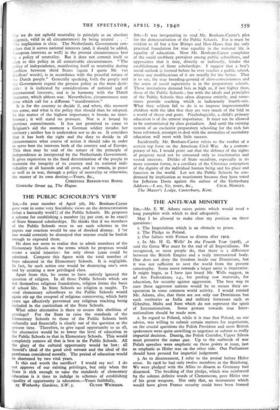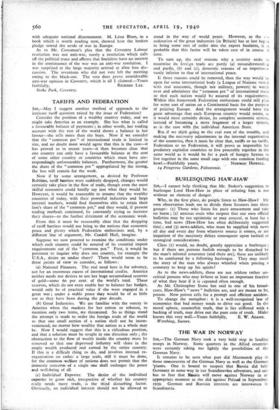THE ANTI-WAR MINORITY
SIR,—Mr. E. W. Adams raises points which would need a long pamphlet with which to deal adequately.
May I be allowed to make clear my position on three questions : r. The Imperialism which is an obstacle to peace.
2. The Pledge to Poland.
3. Our failure with France to disarm after 1919.
1. In Mr. H. G. Wells' In the Fourth Year (1918), said the Great War must be the end of all Imperialisms. He recognised, as most people do, that there is a difference between the British Empire and a truly international body. One does not deny the freedom inside our Dominions, but it was not sufficient to save the world from the present catastrophe. Some move towards a larger unity is imperative. It might begin, as I have just heard Mr. Wells suggest, in ad hoc Federations, e.g., for pooling raw materials, for education, for security against aggression. The best way to cure these aggressor nations would be to secure their co- operation in some common world activity. I would remind Mr. Adams, also, that there are not only our Dominions but such territories as India and military fortresses such as Gibraltar, Malta and Suez which do not represent the spirit of Internationalism. Some gesture towards true Inter- nationalism should be made now.
2. In regard to Poland, while it is true that Poland, on our advice, was willing to submit certain matters for negotiation, on the crucial questions the Polish President and most British spokesmen were quite unwilling to negotiate or submit to really impartial decision. Danzig, the Polish Corridor, Upper Silesia must preserve the status quo. Up to the outbreak of war Polish speeches were emphatic on these points at issue, just as emphatic as Hitler was on the other side. Our Parliament should have pressed for impartial judgement.
3. As to disarmament, I refer to the period before Hitler arose. In 1928 he had only twelve members in the Reichstag. We were pledged with the Allies to disarm as Germany had disarmed. The breaking of that pledge, which was reinforced by the solemn definite words of Clemenceau, gave Hitler one of his great weapons. Not only that, an instrument which would have given France security could have been framed with adequate national disarmament. M. Leon Blum, in a book which is worth reading now, showed how the broken pledge sowed the seeds of war in Europe.
As to Mr. Crossman's plea that the Coventry Labour resolution was not anti-war, surely a resolution which calls off the political truce and affirms that Socialists have no interest in the continuance of the war was an anti-war resolution. I was surprised at the large majority arrived at after free dis- cussion. The seventeen who did not vote left the meeting owing to the -black-out. The vote does prove considerable anti-war opinion in Coventry, which is all I claimed.—Yours











































 Previous page
Previous page